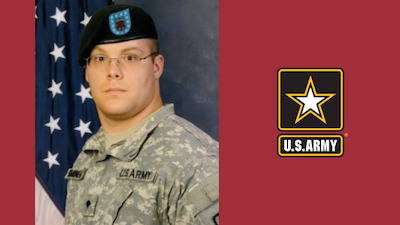Veterans Day Q&A with Doctor of Nurse Anesthesia student Eric Simoneaux
Q: In which branch of the military did you serve, during which years, and what was your final rank?
A: I served in the Army as a Reservist from April 2008 through May 2016. My final rank was E-5, Sergeant. I grew up in Baton Rouge, Louisiana, and joined the Army at 20 years old. I met my wife in Combat Medic school in San Antonio (she was also a Combat Medic, but Michigan National Guard). We now live in Trenton with our two boys.
Q: What made you decide to serve?
A: I decided to serve January of 2008, when my twin brother's unit was called to deploy to Iraq. My official swear-in date was postponed to April so I could be there when his unit left for overseas.
Q: How did your mother feel about having two sons in the service?
A: My twin brother is still serving. He is a full time Army recruiter stationed out of Sandusky, Ohio. For the first time in over 10 years, I can drive to my brother's house in 90 minutes. With his deployment along with me being in Basic Training, my mom was a ball of stress for sure. She handled that part well, surprisingly, since my brother wasn't in a combat area of Iraq. My deployment was combat related, or at least very close to combat. She had a rough time then because my oldest was 2 and my youngest was just turning 1 (I Facetime called him from Baltimore on our way out to sing Happy Birthday to him). That was rough. But the experience I had with the Forward Surgical Team was absolutely amazing and I loved every second.
Q: Did you know you wanted to go into health care when you enlisted or did something happen during your service that pointed you toward that career path?
A: Initially, I wanted to go into law enforcement prior to my joining the military. My first attempt at college was unsuccessful, so I decided to work in the construction business with my dad. After two years of manual labor, my brother got his call that he was deploying, which started my drive to also join the military. I consulted my uncle, who was a registered nurse and also in the Louisiana National Guard, about how I should go about getting into the military. He slowly convinced me to transition to health care because military police can sometimes have a difficult time transitioning into civilian law enforcement. With the promise of a great civilian career ahead of me by my uncle, I decided to give health care a shot.
Q: What brought you to Wayne State?
A: During much research on anesthesia programs in the state of Michigan, Wayne State had my attention from the start. WSU's reputation as an excellent program that offers the best opportunities to learn and grow as a provider made my choice to become part of Wayne State's legacy an easy one.
Q: How do you feel your military career informs or affects your health care career?
A: My military experience showed me the value of teamwork - that taking care of patients is not an individual effort. Also, to not strive to be the "best," but to strive to be the person that when your team sees that you are their medic, scrub, circulator or anesthesia provider, they feel a sense of relief, because they know you are great at what you do and will elevate everyone's performance as a team member.
Q: What do you hope to do with your degree after graduation?
A: I hope to use my degree to teach and mentor new CRNAs and SRNAs by continuing to strive for a learning environment at the head of the bed. I also would like to find ways to merge anesthesia care with potential Surgical Intensive Care teams to assist in facilitating care for autistic patients. As autism continues to grow in prevalence, we will soon see in all aspects of health care adult and geriatric autistic patients needing elective procedures (total joints, heart surgery, etc.). I would like to continue in the growth of anesthesia and pain management in this patient population to effectively communicate and provide essential care.
Read more in our Veterans Day Q&A series.
WSU Applebaum's Doctor of Nurse Anesthesia program is led by exceptional faculty and clinical instructors dedicated to the profession and the teaching of students using state-of-the-art teaching facility and anesthesia classrooms. The DNAP degree is 36 months, designed to offer registered nurses an advanced education and full scope of practice as a Certified Registered Nurse Anesthetist (CRNA). Graduates will also meet the requirements for the National Certification Examination. Learn more about the application process.